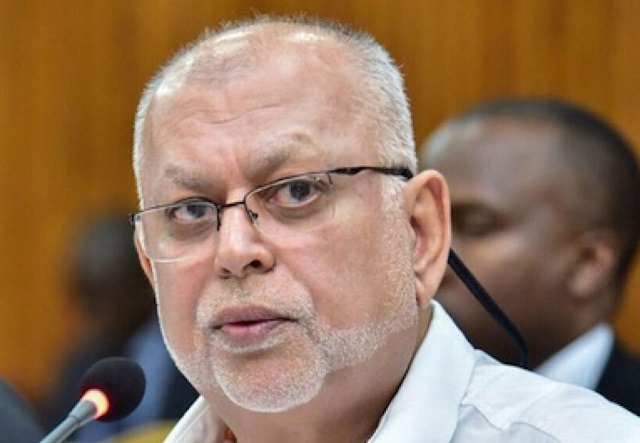
Despite being expelled by Idi Amin in the 1970s, Ugandans of Indian descent today make an outsize contribution to the country’s economy. All you need to know about the families that matter.
Kampala, Uganda | AGENCIES | At the India-Uganda Trade Mission organised in October by Equity Bank, Minister for Trade and Industry David Bahati said that Indians in Uganda contribute more than 60% of the country’s GDP.
The statistic is often cited by members of the Indian community in Uganda, whose economic heft far outweighs their numbers. ‘We contribute a lot to the economy of this country. Asians [Indians] here make up 0.001% of the population, yet we contribute 60%-65% of the revenue,’ says Sudhir Ruparelia, one of Uganda’s wealthiest individuals of Indian descent.
Brought to Uganda by the British colonialists at the beginning of the 19th century to help construct the Uganda Railway – and later supported by the colonial administration to flourish in business – Indians have been a dominant force in Uganda’s commercial sector for over a century. Some of their businesses date back to the early 1900s.
In 1972, Idi Amin expelled the Indian community from Uganda, largely due to their economic influence. In 2022, Ugandan historian Samwiri Lwanga-Lunyiigo authored Uganda: An Indian Colony, 1897-1972, which shows that while Indians comprised only 1% of Uganda’s population of 8 million, they controlled 75% of the economy and contributed just 5.4% of the tax revenue at that time.
Since that time, prominent Indian families have rebuilt their business empires in the country. These are the names that shine most brightly in the Ugandan Indian constellation.
The Mehta family
One of Kampala’s oldest Indian families and among East Africa’s earliest multimillionaires, the Mehta family has played a prominent role in Uganda’s agricultural sector since the early 1900s. The family’s ventures have included tea plantations, ginneries, floriculture, sugarcane plantations, sugar factories, engineering and insurance. This diverse portfolio has helped shape Uganda’s commercial landscape.
Today, the Mehta Group operates six companies in Uganda, including the Sugar Corporation of Uganda Limited (SCOUL) and Cable Corporation Ltd, the latter controlling 65% of the country’s cable and electrical wire market.
The family has also diversified into financial services with TransAfrica Assurance, a major non-life insurance provider across Africa. Additionally, TransAfrica Commerce Limited offers a wide range of products – from Bajaj CFL bulbs and noodles to transformers and engineering goods – exported to Congo, Rwanda, Burundi, Sudan and Tanzania.
Through Ugma Engineering Corporation Ltd., the family manufactures cast iron, steel, ferrous alloys, and non-ferrous castings, supporting key sectors such as sugar, cement, textiles, railways, mineral processing, steel rolling, and oil and gas.
Though the Mehta family began as a Ugandan enterprise, it has since expanded internationally, with a presence in India, Kenya, Canada and the United States.
The Madhvani family
The Madhvani family’s business legacy began with Muljibhai Madhvani, an Indian-born entrepreneur who migrated to Uganda at the age of 14. In 1912, he started his first venture in Jinja, eastern Uganda, which would eventually grow into the Madhvani Group, one of Uganda’s leading conglomerates.
Often referred to as the ‘Rockefellers of Uganda’, the Madhvani family is one of the most renowned Indian business families in Uganda and East Africa, with a strong presence in agriculture and agro-processing. It owns large-scale plantations for sugarcane, tea and floriculture.
Their flagship company, Kakira Sugar Works, is one of Uganda’s largest sugar producers. In addition to sugar, the group manufactures sweets, confectioneries, packaged tea, soap and a variety of packaging materials, including glass, corrugated cartons and crown corks. The group has also expanded into steel production, including rolled products and drawn wire.
The Madhvani Group operates a power plant that generates 40 MW, with 25 MW supplied to the national grid and 15 MW used to meet the group’s internal energy needs.
In Uganda’s expanding services sector, the group is involved in hospitality, tourism, insurance, information technology, media and communications, construction, and the distribution of industrial products and consumer goods.
According to the company’s website, the Madhvani Group’s annual turnover exceeds $500m, and its assets are valued at over $1bn. The group produces around 50% of Uganda’s sugar and is one of the country’s top taxpayers, according to Uganda’s ministry of finance. From its roots in Uganda, the group has expanded to Kenya, Tanzania, Rwanda, South Africa, the Middle East, India and North America.
The Mukwano family
Mukwano Group is another influential conglomerate owned by an Indian family in Uganda. Its products can be found in nearly every household, highlighting its widespread impact. The company manufactures a diverse range of high-quality, affordable fast-moving consumer goods.
The history of the Mukwano family dates back to 1904, when Ali Mohamed Karmali began working as a shop assistant in Jinja. He later traded in coffee and cotton, earning a strong rapport with the locals, which earned him the nickname ‘Mukwano’, meaning ‘friendship’ in Luganda.

In the 1960s, Karmali’s son, Amirali Karmali, expanded the family business into the transport sector. Despite the challenges of Idi Amin’s regime, Amirali remained in Uganda. In the late 1970s, he founded Egesa Commercial Agencies, which evolved into Mukwano Enterprises. By the mid-1980s, Mukwano opened its first industrial venture, a soap factory in Kampala.
Today, Mukwano is a major player in manufacturing, agriculture, logistics, banking and property development. The group produces a wide range of consumer goods, including soaps, oils, detergents, plastics and drinking water.
Mukwano’s products are not only sold in Uganda but also in the Democratic Republic of Congo, Rwanda, South Sudan, the Central African Republic, Tanzania, Kenya, Burundi, and other regions.
The Ruparelia family
Unlike the other prominent Indian-descendant business families in Uganda, the Ruparelia family’s business history is relatively recent, but their influence is undeniable. The family controls a diverse portfolio of businesses across several key sectors, including hospitality, real estate, education, banking, insurance, sports, labour export, media and floriculture.
Operating as the Ruparelia Group, Sudhir Ruparelia, the family patriarch, is one of Uganda’s wealthiest businessmen. Over the past 37 years, he has built a vast empire. In 2019, Forbes estimated his net worth at $1.2bn. In recognition of his contributions to Uganda’s economy, President Yoweri Museveni awarded him the Golden Jubilee Presidential Medal in 2013.
Sudhir is the third generation of the Gujarati family born in Uganda, following his great-grandfather’s migration to Uganda from Mombasa, Kenya, in 1903. At 16, Sudhir moved to the UK after Idi Amin’s expulsion of Asians from Uganda. He returned to Uganda with APS25,000, which he used to build his wealth and establish the family empire.
Karim Hirji
A prominent figure among Uganda’s influential Indian businessmen, Hirji bridges the legacy of families like Madhvani, Mehta and Mukwano with newer success stories like the Ruparelia family.
Initially known for his achievements as a champion automobile racer with the Dembe Rally Team in the 1960s and 1970s, Hirji chose to remain in Uganda during the Asian expulsion under Idi Amin. Once the political and economic environment stabilised, he focused on rebuilding his business empire.
In the late 1980s and early 1990s, Hirji began trading in textiles and alcoholic beverages from a small shop in central Kampala. His first company, Dembe Enterprises, has since grown into the Dembe Group of Companies, which includes an automobile dealership, finance and insurance businesses, an amusement park, and the prestigious Imperial Group of Hotels.
Abid Alam
The Abid Alam family has deep roots in Uganda, having lived there for generations. Their business, the Alam Group of Companies, has been operating for over half a century and is a key player in Uganda’s building, construction, and real estate sectors. The group is also involved in agriculture, with a major sugar plantation producing Kaliro Sugar.
In 1995, the Alam Group launched Oxygas, which has since become Uganda’s leading distributor of industrial, medical, cooking, and specialty gases, further diversifying the family’s impact on the Ugandan economy.
Sikander Lalani
Sikander Lalani, the founder of Roofings Group, is a prominent figure in Uganda’s manufacturing industry. Born in Nsambya Hospital, Kampala, in 1944, he initially trained as a histopathologist and practised in the United Kingdom before shifting to business.
In the 1970s, he opened a retail electronics store in Kigali, Rwanda. With support from the Rwanda Development Bank, he secured a $1m loan from the World Bank in 1978 to establish a roofing materials factory in Kigali. However, following the 1994 Rwandan genocide, Lalani returned to Uganda.
In 1995, he launched Roofings Group in Uganda with an initial investment of $2m, a small team of 60 employees, and a 3,000-square-metre facility. Today, Roofings Group has grown substantially, with over $350m in investment, 2,000 employees, and more than 32,000 square metres of covered space.
Roofings Group has expanded from steel manufacturing to include plastic construction materials, becoming a leading supplier in Uganda and East Africa. Its products range from roofing sheets and cladding to fencing products, galvanised wire coils, and Aluzinc (AZED) coils, solidifying its role as a major player in the region’s construction sector.
Other notable businesses run by Indians
Other notable Indian families and businesses in Uganda include the Jobanputra family, which operates Picfare and Nyanza Textile Industries Limited (Nytil), Uganda’s largest textile companies.
Further business figures such as Lalan, Mukesh Shukla, Rafiki Group, Tororo Cement, Roofings Group, and Kiboko Group have also firmly established themselves as key players in Uganda’s business landscape, generating millions in annual turnover.
****
Source: www.theafricareport.com
 The Independent Uganda: You get the Truth we Pay the Price
The Independent Uganda: You get the Truth we Pay the Price



